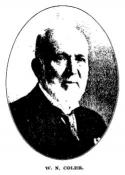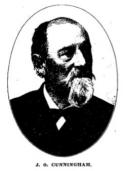The Urbana Union was the very first newspaper in Champaign County. In September 1852, a young lawyer named William N. Coler moved to Urbana. He partnered with a printer named Henry Kirk Davis and together they established a printing office in the court house. They began by purchasing a small stock of printing material in Cincinnati for $600, which was shipped to the nearest Indiana town via the Wabash Canal, then hauled to Urbana. Volume 1, Number 1 of The Urbana Union was issued on September 25th.
News about the Chicago branch line of the Illinois Central Railroad was quite prominent in the newspaper and became the talk of the town. It also covered the 1852 presidential campaign in which Franklin Pierce and General Winfield Scott were opposing candidates of the Democratic and Whig parties.
On July 14, 1853, not even a full year later, the paper was sold to Benjamin A. Roney, a printer of some experience, and Joseph O. Cunningham, a writer with no experience.
In the beginning, The Union did not circulate much. The editors and publishers did not make a profit.
Joseph O. Cunningham had this to say about the newspaper in his book “The History of Champaign County”:
“With scarcely 6,000 inhabitants in the county and only three post offices (Homer, Urbana, and Mahomet); with court business occupying less than six days of each year; remote from the center of trade and facilities of transportation; a frontier county in all but locality; a population not awakened to the importance of supporting a home newspaper, weak though it might be; surrounded by boundless prairies, from which little wealth has thus far been drawn; without capital and almost without experience- it seems incredible to the writer that the office was not swamped at once.”
Cunningham continued as editor and proprietor for five years. Under his management, the The Union became a supporter of the newly organized Republican party and of Abraham Lincoln in the Lincoln-Douglas campaign of 1858. He was a Republican editor at a time when it was extremely unpopular and somewhat dangerous to advocate abolition principles. “Independent in all things, neutral in nothing,” became the newspaper’s slogan.
An article from September 25, 1856, mentions Lincoln speaking to the Republicans of Champaign County:
“Last Thursday, the day of our mass meeting, was a proud day for the Republicans of Champaign County, and for freedom in Illinois! … Early in the Morning the people from every direction commenced flowing into town [Urbana] with banners, badges and mottoes and the loudest ‘shrieks for freedom.’ Some came in processions with the delegations from their neighborhoods and some came singly, while others came in wagons, carriages, on horseback, on mules and on foot, none forgetting that they were assembling as a free people for the purpose of ‘securing the blessings of liberty to them and their posterity.’ After raising the ‘flag of our Union’ to the top of a pole 150 feet high, which had been previously raised, and giving hearty cheers for Freemont, the throng moved, not to the court house, but to Webber’s Grove.’ …After arriving upon the grounds, where were prepared two stands for speakers, the audience was addressed by various speakers…In the afternoon, Mr. Lincoln, Illinois’ noble son, in an unusually able and masterly manner, plead the cause of our young but powerful organization…”
The Urbana Union underwent many changes during its lifetime. In October 1857, a branch office was opened in Champaign (then, ‘West Urbana’) and found success in the growing town. At one point the name was briefly changed to The Saturday Visitor, but was changed back because it did not meet public approval. Over the years it was passed on to various publishers and printers until it met its end in 1882.
Below is another quote from Cunningham’s book that illustrates the humble beginnings of Champaign County’s first newspaper compared to the ones that were present in 1905, a half century later. If only he could see how we are sharing news today.
“Looking from the office of "The Union” in 1854, with its one slow hand press for all work, its small assortment of type and accessories – all crowded into a little room eighteen feet square with unplastered walls, where a wood stove warmed but did not heat the room; where the moveable type was set by hand, and the small edition was worked off at the expense of a day’s work – to one of the four offices at the center of the county, metropolitan in all their appointments; where the work of type-setting under skillful hands, is swiftly done by the linotype machine; where the press-work, by electrically operated machine presses in ample rooms, well heated by steam, is automatically done in minutes, where the hand-press required hours, one is led to doubt his senses and to declare it all an untruthful vision, and himself the dupe of a hypnotic century. What will the next half-century ask the passer-by to believe?”
Erica Stark
Archives Assistant
Sources:
The Biographical Record of Champaign County, Illinois
The History of Champaign County by Joseph Oscar Cunningham
Hot Type by Thomas Kacich




